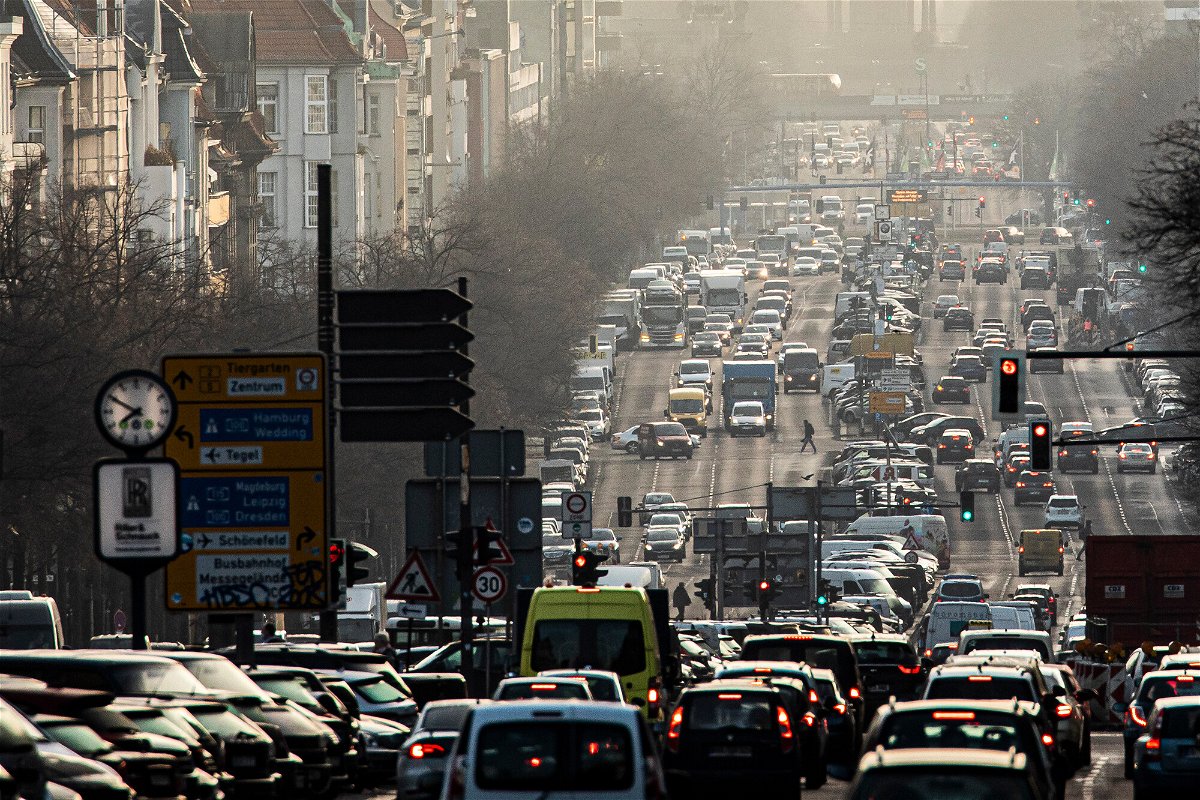Europe aims to kill gasoline and diesel cars by 2035

The morning rush hour on the street Bismarckstrasse is pictured during morning light on February 25 in Berlin
By Charles Riley, CNN Business
The European Union has announced plans to end the sale of polluting vehicles by 2035, an ambitious goal that would put hybrid cars on the endangered species list and usher in a rapid and dramatic shift to fully electric models.
The European Commission said Wednesday that it wants to require the auto industry to slash the average emissions of new cars by 55% by 2030. A further reduction to 100% by 2035 effectively means that all new cars registered from that year onward must be zero-emission vehicles.
The new 2030 goal would be a significant leap from the current EU target of cutting emissions from new cars by 37.5%, which was only set in December 2018.
The proposed rule changes are part of a much larger package aimed at propelling the European Union towards its goal of cutting greenhouse gas emissions by at least 55% by 2030 compared to 1990 levels. Europe wants to be the first continent to be climate neutral in 2050.
“The fossil fuel economy has reached its limits. We want to leave the next generation a healthy planet as well as good jobs and growth that does not hurt our nature,” European Commission President Ursula von der Leyen said in a statement.
To facilitate the shift to electric cars, the Commission said it would require the 27 EU member states to expand vehicle charging capacity. Charging points will be installed every 60 kilometers (37.3 miles) on major highways, and the minimum tax rate for gasoline and diesel fuel will be hiked.
“This is a turning point for the auto industry and good news for drivers,” said William Todts, the executive director of lobby group Transport & Environment. “The new EU rules will democratize electric cars and give a major boost to charging.”
The auto industry plays a vital role in Europe’s economy, accounting for 7% of gross domestic product and supporting 14.6 million jobs in the region. But transport is the only sector where greenhouse gas emissions are rising, and road vehicles accounted for 21% of CO2 emissions in 2017.
Carmakers have seen the writing on the wall, and many have announced ambitious plans in recent months to increase production of electric vehicles. Investors have rewarded the most ambitious companies by boosting their share prices.
Volkswagen, which owns brands including Audi and Porsche, said Tuesday that it wants electric vehicles to account for 50% of its sales by 2030. By 2040, Europe’s largest carmaker plans to sell only zero-emission vehicles in its major markets, which include the United States and China.
Ford has announced plans to sell only electric passenger vehicles in Europe by 2030. Renault, Volvo, BMW and Mercedes-Benz owner Daimler have outlined their own programs to boost production of cleaner cars.
Still, many carmakers will need to accelerate their plans to meet the EU targets, which are among the world’s most aggressive. In order to balance out the emissions generated in 2030 by vehicles with internal combustion engines, including hybrids, carmakers will need to sell loads of electric cars.
“These targets should not come as a surprise [to carmakers], although they clearly require an accelerated shift towards [battery electric vehicles] over time,” Barclays analysts wrote in a recent research note.
The pace of change demanded by regulators matters to carmakers because they plan to use profits from sales of gas and diesel vehicles to fund the research and development of electric vehicles.
Volkswagen finance chief Arno Antlitz said on Tuesday that the company’s internal combustion engine business would “help to generate the profits and cash flows” needed to pay for investments in software, autonomous driving and production platforms for electric vehicles. Volkswagen has earmarked €73 billion ($86 billion) through 2025 to develop the technologies.
It could be years before the EU rules come into force. The plan needs to be read, amended and approved by lawmakers in the EU Parliament and the EU Council, the forum in which the elected leaders of each member state debate such matters.
Britain announced last year that it would ban sales of new gasoline and diesel cars starting in 2030, with sales of some new hybrids continuing until 2035.
Still, time is of the essence. Todts said carmakers must move quickly to help solve the climate crisis.
“The problem is carmakers will only have to start selling those cleaner cars in 2030. Our planet cannot afford another nine years of big talk but little action from the auto industry,” he said.
The-CNN-Wire
™ & © 2021 Cable News Network, Inc., a WarnerMedia Company. All rights reserved.